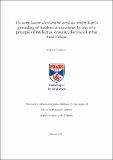Files in this item
The starry heavens above and the moral law within : Kant’s grounding of freedom in experience by way of a principle of intellectual causality, discovered in his third Critique
Item metadata
| dc.contributor.advisor | Timmermann, Jens | |
| dc.contributor.advisor | Hope, Simon | |
| dc.contributor.author | Paterson, Gareth Hugh | |
| dc.coverage.spatial | vi, 144 p. | en_US |
| dc.date.accessioned | 2021-05-27T13:57:35Z | |
| dc.date.available | 2021-05-27T13:57:35Z | |
| dc.date.issued | 2021-06-28 | |
| dc.identifier.uri | https://hdl.handle.net/10023/23264 | |
| dc.description.abstract | Kant claims in his third Critique (1790) to have proven that the idea of freedom is scibilium, known with certainty. My aim is simply to take his claim seriously. This involves the attempt, which Kant himself suggests in the first Critique is key to properly understanding a philosopher, to form a plausible ‘idea’ of his system. I do so by interpreting it according to the end that he claims. I contend that Kant realises this claimed outcome by demonstrating the necessary effects of a purely intellectual causality in a certain kind of experience in inner sense: pleasure in beauty. This, I argue, then allows him to complete his proof of the reality of freedom. I also present evidence to suggest that Kant knew what must be involved in this proof much earlier than is generally conceded. It is also my view that this interpretation is of no detriment to the consistency of his philosophical system as a whole; in fact, it allows an understanding that fits with his claims. The arguments involved in this thesis involve opposing the majority view that certain concepts appeared first in Kant’s third Critique and must also challenge accepted perspectives on parts of Kant’s other relevant works. It will be necessary to examine aspects of Kant’s epistemology and metaphysics, his empirical psychology, aesthetics, and his moral and theoretical philosophy. In such a broad body of work as Kant’s, it can be easy to become overwhelmed and lost, or even to find corroboration for views that are at odds with the general trend of his thinking. In a best attempt to avoid this, I will throughout regulate my own idea of his system and constrain my investigations by remaining conscious of his claims, i.e., by way of a thread tethered to Kant’s own claimed conclusion. | en_US |
| dc.language.iso | en | en_US |
| dc.publisher | University of St Andrews | |
| dc.rights | Creative Commons Attribution-NonCommercial-NoDerivatives 4.0 International | * |
| dc.rights.uri | http://creativecommons.org/licenses/by-nc-nd/4.0/ | * |
| dc.subject | Immanuel Kant | en_US |
| dc.subject | Free will | en_US |
| dc.subject | The idea of freedom | en_US |
| dc.subject | Aesthetics | en_US |
| dc.subject | Epistemology | en_US |
| dc.subject | Practical philosophy | en_US |
| dc.subject | Theoretical philosophy | en_US |
| dc.subject | Metaphysics | en_US |
| dc.subject | Moral philosophy | en_US |
| dc.subject | Intellectual causality | en_US |
| dc.subject | History of philosophy | en_US |
| dc.subject | 18th century German philosophy | en_US |
| dc.subject | Complex systems | en_US |
| dc.subject | Emergent properties | en_US |
| dc.subject | Beauty | en_US |
| dc.subject | Transcendental idealism | en_US |
| dc.subject | Knowledge | en_US |
| dc.subject | Enlightenment philosophy | en_US |
| dc.subject | Empirical psychology | en_US |
| dc.subject | Anthropology | en_US |
| dc.subject | 'Critique of pure reason' | en_US |
| dc.subject | 'Critique of practical reason' | en_US |
| dc.subject | 'Critique of the power of judgment' | en_US |
| dc.subject | 'Groundwork of the metaphysics of morals' | en_US |
| dc.subject | Reflecting judgment | en_US |
| dc.subject | Purposiveness, principle of | en_US |
| dc.subject | Geometry and mathematics | en_US |
| dc.subject.lcc | B2798.P28 | |
| dc.subject.lcsh | Kant, Immanuel, 1724-1804--Criticism and interpretation | en |
| dc.subject.lcsh | Kant, Immanuel, 1724-1804. Kritik der Urteilskraft | en |
| dc.title | The starry heavens above and the moral law within : Kant’s grounding of freedom in experience by way of a principle of intellectual causality, discovered in his third Critique | en_US |
| dc.type | Thesis | en_US |
| dc.type.qualificationlevel | Masters | en_US |
| dc.type.qualificationname | MPhil Master of Philosophy | en_US |
| dc.publisher.institution | The University of St Andrews | en_US |
The following licence files are associated with this item:
This item appears in the following Collection(s)
Except where otherwise noted within the work, this item's licence for re-use is described as Creative Commons Attribution-NonCommercial-NoDerivatives 4.0 International
Items in the St Andrews Research Repository are protected by copyright, with all rights reserved, unless otherwise indicated.


